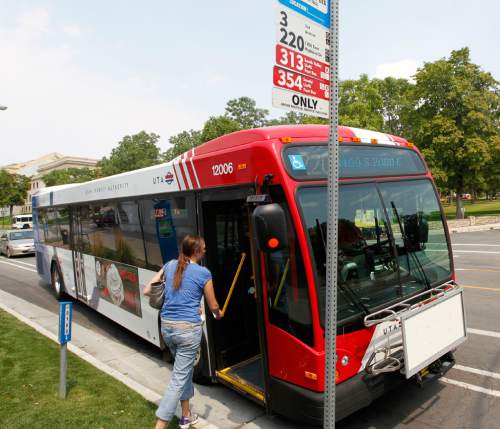This is an archived article that was published on sltrib.com in 2015, and information in the article may be outdated. It is provided only for personal research purposes and may not be reprinted.
Question: If somebody at the Utah Transit Authority cooks up a scheme for a secret trip to Switzerland, and nobody on the agency's board is able to hear it, is it still a bad idea?
Answer: No. It's a worse idea.
If more of the transit agency's business plans were aired in public meetings, it would do more than allow the public to be informed. As if that weren't reason enough. It would also force more of those ideas that may have seemed so wonderful when sketched out on the back of a napkin to be expressed out loud, and to be seen for the duds they were.
The more that we hear about the UTA's Swiss connection, a clandestine junket by some current and former board members and their lobbyists to visit rail systems and a rail-car maker in Switzerland, the worse it sounds. Which is what can happen when there was no sound at all before the fact.
First we heard that Utah House Speaker Greg Hughes, former UTA Board chairman, helped arrange a tour of Swiss rail systems and a visit to the rail-car maker Stadler Rail.
Because it was not agency-funded, but mostly paid for by lobbyists and others with business connections to the agency, the UTA Board did not have to approve, or even be officially informed of, the trip. Which is too bad, because if the idea had to come before the board at a public meeting, it likely would have been shot down. Or, better, those arranging it might have had the sense to drop the whole scheme as they tried, and failed, to draft a justification the board might buy.
Now comes news of an embarrassing email back-and-forth between UTA staff and a federal agency on the question of whether UTA could enter into a sole-source contract allowing a rail maintenance company to share the shop that services UTA FrontRunner trains.
Last year, UTA sought federal approval for such a deal, arguing that it made economic and logistical sense to just negotiate with the company that is already using the barn, Wabtec, rather than open the whole process up for bid. Later, other UTA executives asked the Federal Transit Administration to let Stadler bid on the deal, too.
Something as important as a contract allowing an outside company to use UTA facilities should have been brought before the board at every stage of the process. Because it wasn't, the whole deal is tainted and going back to square one. And otherwise legitimate efforts to recruit Stadler to Utah have been damaged, maybe permanently.
Many ideas are not fully formed until they've been explained to someone else. Nor, when public agencies are concerned, are they legitimate until they've been debated in public.



